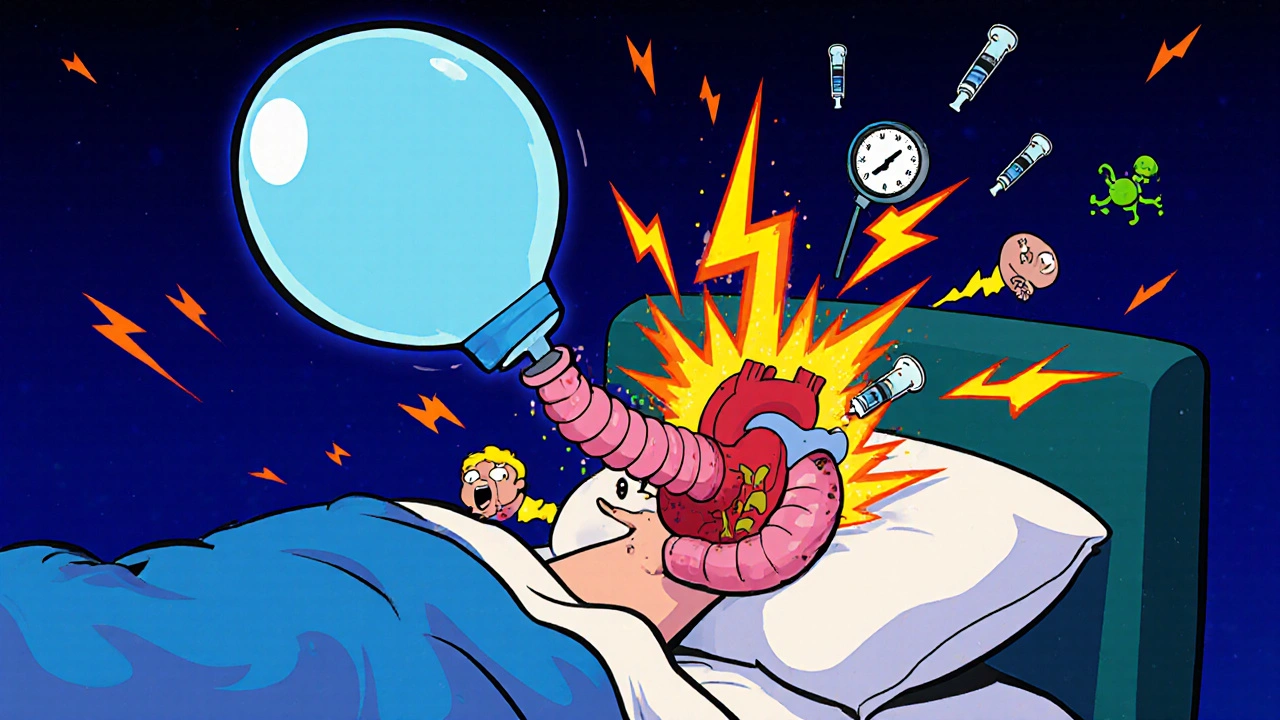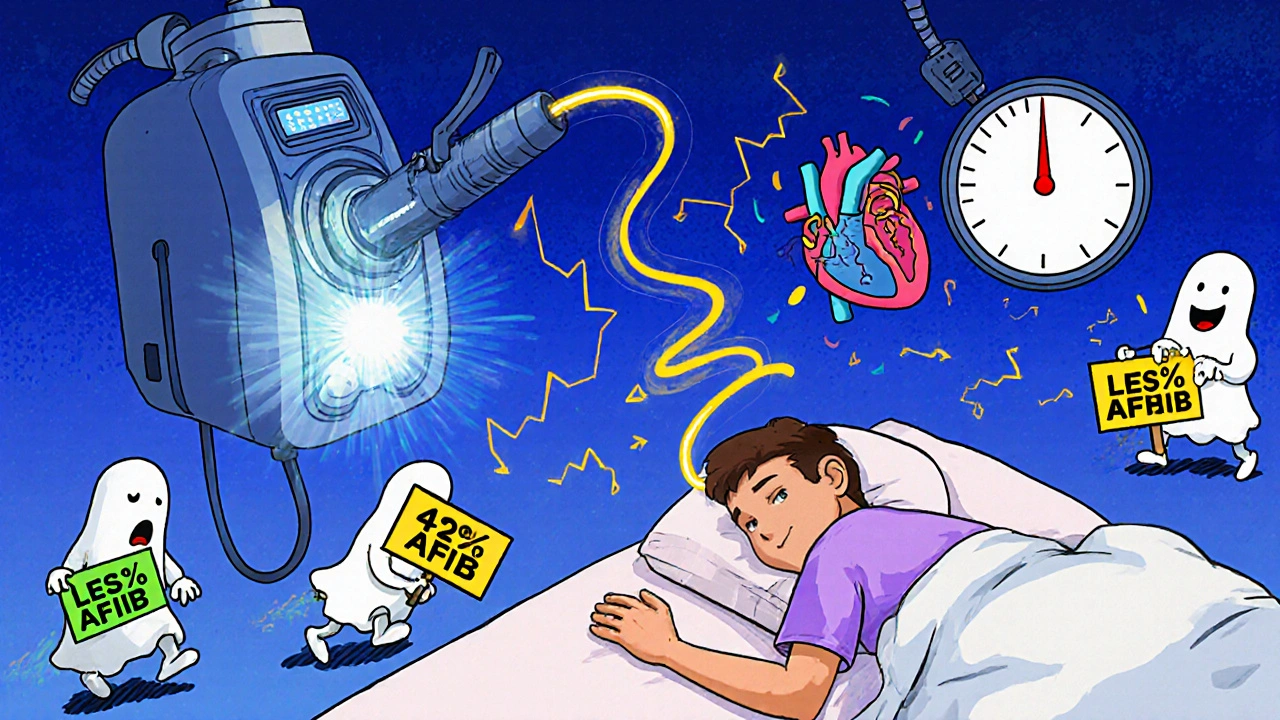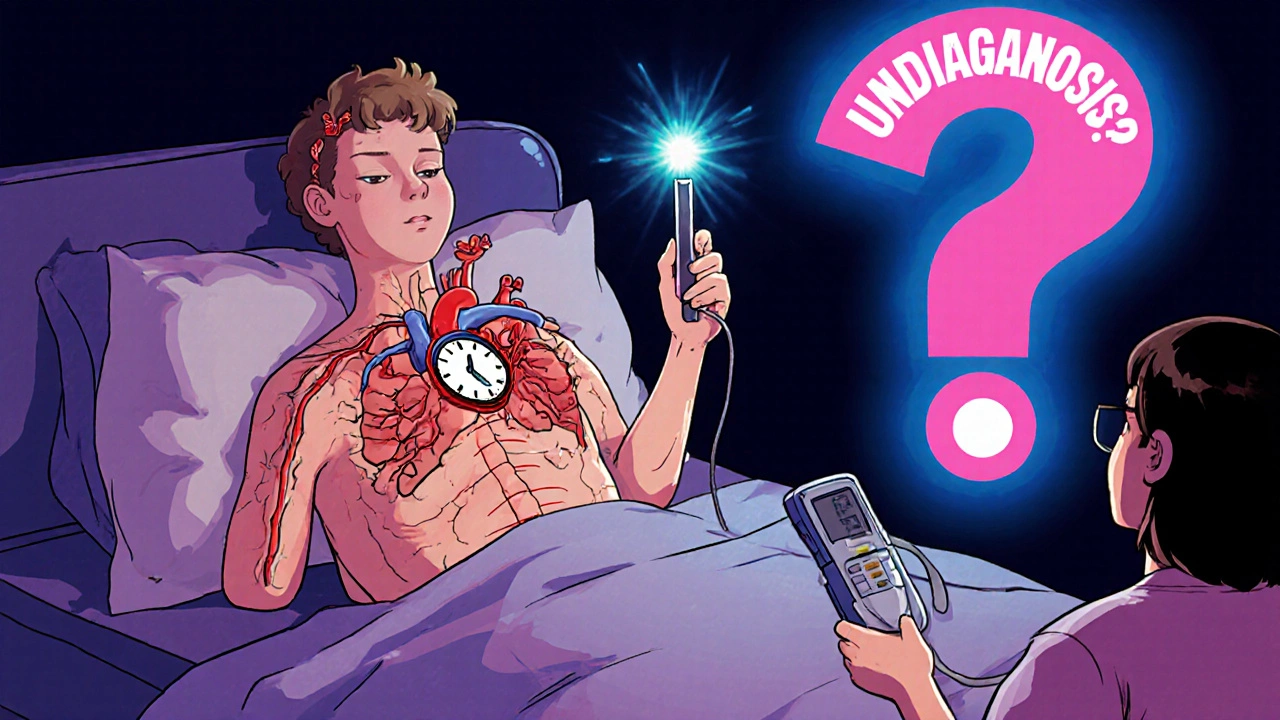 Nov, 24 2025
Nov, 24 2025
When you stop breathing in your sleep, your heart doesn’t just wait it out-it panics. Every time your airway collapses during obstructive sleep apnea (OSA), your body screams for oxygen. Your blood pressure spikes. Your heart skips beats. Your arteries tense up. And if this happens 30, 50, or even 100 times a night, your heart doesn’t recover. It gets worn down, piece by piece.
How Sleep Apnea Strains Your Heart
Obstructive sleep apnea isn’t just loud snoring or feeling tired in the morning. It’s a medical condition where your throat muscles relax so much during sleep that your airway closes, cutting off airflow. These pauses last 10 seconds or longer, and they can happen dozens of times an hour. Each time, your oxygen levels drop. Your brain wakes you up-just enough to gasp for air-but not enough for you to remember it in the morning.
What happens to your heart during those pauses is brutal. As oxygen drops, your body triggers a fight-or-flight response. Your sympathetic nervous system fires like a wildfire, flooding your bloodstream with adrenaline. This causes your blood pressure to jump by 20 to 40 mmHg in seconds. That’s like suddenly sprinting up a flight of stairs-except you’re lying still, asleep.
And it doesn’t stop when you wake up. Studies show that people with severe OSA often have high blood pressure all day long, even when they’re resting. This isn’t just stress or aging-it’s direct damage from repeated nighttime surges. The American Heart Association says OSA increases your risk of developing hypertension by 50%, even after accounting for weight, age, and diabetes.
Why Your Heart Starts Skipping Beats
High blood pressure is dangerous, but arrhythmias are the silent killer tied to sleep apnea. Atrial fibrillation-the most common type of irregular heartbeat-is 3 to 5 times more common in people with OSA than in those without it. Why? Because the same pressure swings and oxygen drops that spike your blood pressure also scramble your heart’s electrical system.
During an apnea, your chest cavity creates massive negative pressure as you struggle to breathe. This pulls extra blood into your heart, stretching the chambers. Then, when you finally breathe again, that blood rushes back out. This constant tugging and stretching irritates the heart muscle, especially the atria. Over time, this leads to scarring and fibrosis. A 2024 study in Circulation found that OSA patients had 2.3 times more scar tissue in their upper heart chambers than people without sleep apnea.
This scar tissue doesn’t conduct electricity properly. So instead of a steady, coordinated beat, your heart starts firing randomly. That’s atrial fibrillation. And once it starts, it tends to come back-even after treatments like ablation. Research from UT Southwestern shows that OSA patients who don’t treat their sleep apnea have a 60% higher chance of AFib returning after procedure.

It’s Not Just About Age or Weight
For years, doctors thought OSA’s heart risks were just because people with sleep apnea are overweight or older. But that’s not the full story. Large studies that control for BMI, age, and diabetes still find that OSA independently increases heart attack risk by 30%, stroke risk by 60%, and heart failure risk by 140%.
Even younger adults aren’t safe. A major 2024 study from UT Southwestern found that people under 40 with severe OSA already show early signs of heart damage-thickened heart walls, stiffened arteries, and abnormal heart rhythms. This challenges the old idea that OSA only harms older people. The truth? If you have untreated sleep apnea, your heart is aging faster than the rest of your body.
CPAP Works-If You Use It
The good news? Treating sleep apnea reverses much of the damage. Continuous Positive Airway Pressure (CPAP) therapy keeps your airway open with gentle air pressure. It’s not glamorous. It involves a mask, a tube, and a machine that hums all night. But it’s the most proven treatment we have.
Here’s what happens when people stick with it:
- Systolic blood pressure drops by 5 to 10 mmHg on average
- Atrial fibrillation episodes fall by 42% after one year
- Heart failure symptoms improve significantly
- Many people need fewer blood pressure medications
One user on the American Heart Association’s forum shared that after six months of CPAP, their AFib went from weekly episodes to once every two months. Another reported their blood pressure dropped from 160/95 to 128/82 in three months.
But adherence is the problem. Only about 46% of people use CPAP for the recommended 4+ hours per night. The rest quit within the first year-often because the mask feels uncomfortable, the air feels dry, or they can’t get used to it. The key? Don’t give up after a week. Adjust the mask. Try humidification. Use ramp mode to ease into pressure. Most people who stick with it for 30 days say their energy, mood, and sleep quality improve dramatically.

Who Should Get Tested?
You don’t need to snore loudly or be overweight to have OSA. The American Academy of Sleep Medicine now recommends screening for OSA if you have:
- High blood pressure that won’t respond to three or more medications
- Atrial fibrillation
- Heart failure
- Stroke or transient ischemic attack (TIA)
- Daytime fatigue with no clear cause
And here’s the shocking part: 45% to 65% of people with these conditions have undiagnosed sleep apnea. That means if you’ve been told your high blood pressure is “essential” or “idiopathic,” you might actually have an underlying, treatable cause.
Testing is simple. Most people can start with a home sleep test-a small device you wear overnight that tracks your breathing, oxygen, and heart rate. If results suggest OSA, your doctor will likely recommend CPAP or, in some cases, a newer option like hypoglossal nerve stimulation (Inspire Therapy), which acts like a pacemaker for your airway.
The Bigger Picture
By 2025, the American College of Cardiology is expected to officially classify obstructive sleep apnea as a major cardiovascular risk factor-on the same level as smoking, high cholesterol, and diabetes. That’s because the evidence is no longer just statistical. We now see the actual damage: scarred heart tissue, stiff arteries, irregular rhythms, and chronically elevated blood pressure-all directly caused by repeated breathing pauses during sleep.
It’s not about being lazy or not trying hard enough. It’s about recognizing that sleep isn’t just rest. It’s repair. And if your breathing stops every night, your heart never gets the chance to heal.
If you’ve been told you snore, feel tired all day, or have high blood pressure that won’t budge-ask for a sleep test. Your heart might be silently screaming for help. And the solution might be as simple as a mask and a machine.
Can sleep apnea cause high blood pressure even if I’m not overweight?
Yes. While obesity increases the risk of sleep apnea, the condition itself directly raises blood pressure through repeated oxygen drops and stress hormone surges. Studies show people with normal weight but severe OSA still develop persistent hypertension. The problem isn’t just fat around the neck-it’s how your body reacts when breathing stops.
Does treating sleep apnea help with atrial fibrillation?
Yes, significantly. People with both OSA and atrial fibrillation who use CPAP consistently see a 42% reduction in AFib recurrence after one year. CPAP reduces inflammation, lowers blood pressure, and stabilizes heart rhythms. Without treatment, even successful ablation procedures often fail because the root cause-sleep apnea-is still active.
How do I know if I have sleep apnea if I don’t snore?
Not everyone with sleep apnea snores. Other signs include waking up gasping, morning headaches, dry mouth, frequent nighttime urination, and extreme daytime fatigue-even after a full night’s sleep. If you have high blood pressure, atrial fibrillation, or unexplained fatigue, ask your doctor for a sleep evaluation. A home sleep test can detect apnea even without snoring.
Is CPAP the only treatment for sleep apnea?
No, but it’s the most effective for moderate to severe cases. Other options include oral appliances (for mild cases), weight loss, positional therapy (sleeping on your side), and hypoglossal nerve stimulation (Inspire Therapy), which uses a small implanted device to keep your airway open. Surgery is rarely recommended first. CPAP remains the gold standard because it works for nearly everyone when used correctly.
Can sleep apnea cause heart failure?
Yes. Repeated drops in oxygen and pressure swings force your heart to work harder for years. This leads to thickening of the heart walls, reduced pumping efficiency, and fluid buildup-classic signs of heart failure. Studies show OSA increases heart failure risk by 140%. Treating OSA can reverse early stages of heart failure and prevent progression.

Rachel Villegas
November 26, 2025 AT 04:11After years of ignoring my snoring, I finally got tested last year. Turned out I had severe OSA. My BP was 158/98. Started CPAP. Three months later, it’s 124/80. No meds changed. Just stopped my heart from being punched every night.
Don’t wait until you’re in the ER. This isn’t optional.
Elise Lakey
November 27, 2025 AT 04:16I never thought sleep apnea could do this much damage. I thought it was just about being tired. But reading this made me realize my morning headaches and random palpitations weren’t ‘just stress.’
I’m scheduling a sleep test this week. If it’s this, I owe it to my heart to fix it.
Erika Hunt
November 28, 2025 AT 16:17It’s fascinating how the body’s fight-or-flight response, designed for acute threats like predators or fires, becomes a death sentence when activated 80 times a night during sleep-each time triggering a cascade of catecholamines, oxidative stress, endothelial dysfunction, sympathetic overdrive, and nocturnal hypoxemia-all of which collectively promote vascular remodeling, cardiac fibrosis, and electrical instability in the atria, leading to the high prevalence of atrial fibrillation and hypertension that we now see in longitudinal studies, particularly those published in Circulation and the Journal of the American College of Cardiology over the past five years.
And yet, despite this overwhelming mechanistic evidence, public awareness remains shockingly low, and many physicians still dismiss OSA as a ‘lifestyle issue’ rather than a bona fide cardiovascular pathology that demands clinical intervention.
Sharley Agarwal
November 29, 2025 AT 21:12CPAP is a scam. They just want you to buy machines. You’re better off sleeping on your side and drinking celery juice.
Shirou Spade
November 30, 2025 AT 20:51What strikes me is how we treat sleep like a luxury, not a biological imperative. We optimize our work hours, our diets, our workouts-but when it comes to breathing at night, we shrug. The heart doesn’t care if you’re ‘too busy’ for a mask. It just keeps paying the price.
Maybe the real epidemic isn’t OSA-it’s our collective denial that rest is medicine.
Lisa Odence
December 1, 2025 AT 22:47According to the 2024 AHA Scientific Statement on Sleep-Related Breathing Disorders (DOI: 10.1161/HYP.0000000000000345), untreated OSA is associated with a 2.3-fold increase in left atrial volume index, a 47% higher incidence of nocturnal arrhythmias, and a 1.8-fold increased risk of all-cause mortality in patients with concomitant hypertension.
Additionally, CPAP adherence greater than 4 hours per night has been shown in randomized controlled trials (e.g., SAVE Trial, NEJM 2016) to reduce systolic BP by 5.3 mmHg on average and decrease AFib burden by 38–42% over 12 months.
Also, please use a heated humidifier. It’s not optional. 😊
Jefriady Dahri
December 2, 2025 AT 04:43Man, I used to laugh at people with CPAP machines. Thought they were overdramatizing. Then I saw my dad go from barely walking up the stairs to hiking weekends after 6 months on it.
It’s not magic. It’s just giving your heart a chance to breathe. 🙏
Arup Kuri
December 3, 2025 AT 17:07CPAP is a corporate lie. Big Pharma and sleep machine companies made this up so you’d buy their gear. The real cause? 5G towers messing with your brain’s breathing control. I’ve been sleeping with aluminum foil on my head and my BP dropped 20 points. You’re being manipulated.
prasad gaude
December 3, 2025 AT 20:01In India, we say ‘sone mein dikkat hai’-there’s a problem in sleep. But no one checks. We think snoring is normal. My uncle had a heart attack at 48. Turned out he stopped breathing 60 times an hour.
We fix our cars before they break. Why not our bodies?
Maybe we need to stop treating sleep like a weakness.
Timothy Sadleir
December 5, 2025 AT 02:23While the clinical data presented is statistically significant and aligns with current guidelines from the American College of Cardiology, one must consider the confounding variables inherent in observational studies-particularly the placebo effect of behavioral intervention, the Hawthorne effect of being monitored, and the potential for publication bias in favor of CPAP efficacy.
Moreover, the economic incentives of the sleep medicine industry, which generates over $10 billion annually in the U.S. alone, warrant critical scrutiny. Is this truly a medical breakthrough-or a monetized solution to a symptom we’ve been conditioned to fear?
Let us not mistake correlation for causation, nor convenience for cure.